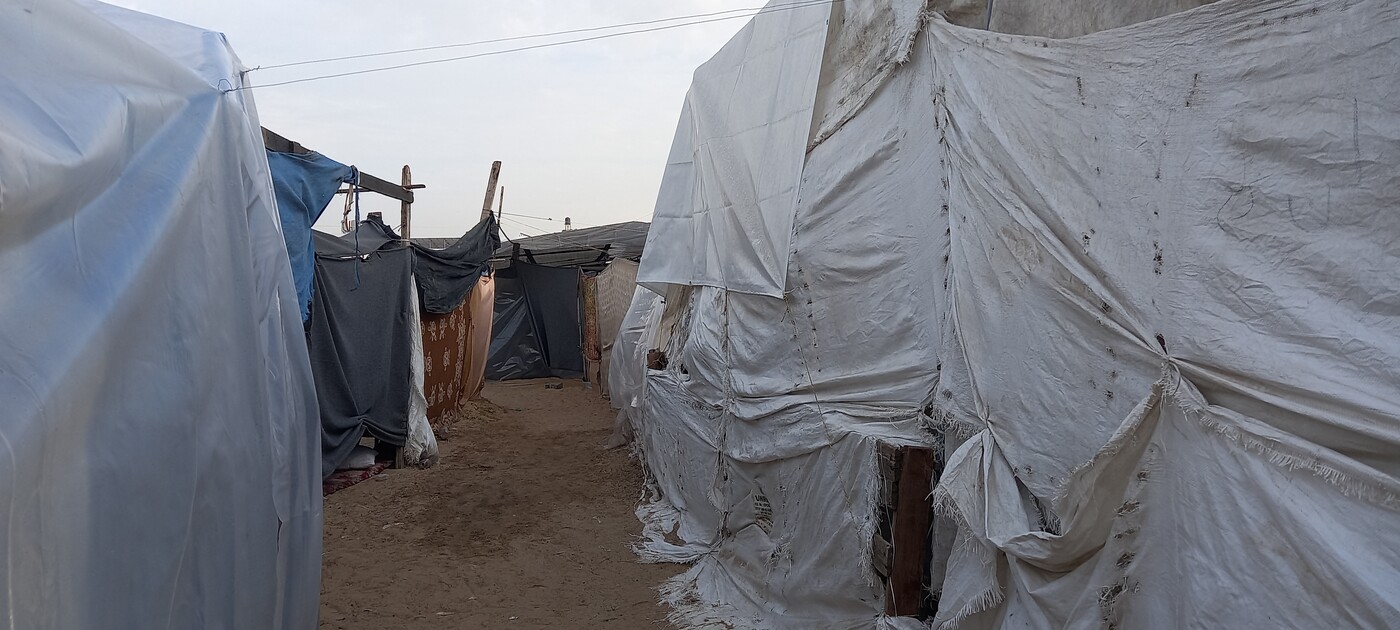The heavy rain and cold weather are putting further strain on people, particularly children in Gaza, where illnesses are spreading rapidly amid overcrowded and unsanitary conditions. With 85% of Gaza’s population now displaced from their homes, tens of thousands of children are living in overcrowded shelters or tents, which offer little protection as the weather worsens.
UNRWA says its shelters in the middle and south of Gaza are currently sheltering nine times more displaced people than they have capacity for. The overcrowding has led to significant increases in diseases and conditions such as diarrhea, acute respiratory infections, skin infections, and lice, according to UNOCHA. Yet, with only 11 of Gaza’s 36 hospitals able to partially function, the healthcare system is on its knees, and tens of thousands of people are having to go without the medical care they need. Alarmingly, Gaza’s health ministry reported today that it had exhausted its supply of children’s vaccines, which leaves them at further risk.
Asma*, a heavily pregnant mother displaced to a shelter in the south of Gaza with her family, told us her children are falling sick and suffering from the cold. She said:
“My house was destroyed; I fled with nine other people. I’m almost eight months pregnant, and I have to sleep in the cold of the winter. We are forgotten in shelters and schools, with nothing to sleep on and no covers. Now that it’s winter, our little ones are freezing. We have no blankets to keep them warm.’
Our children are falling ill with vomiting and diarrhea, and no proper food or nutrition. We haven’t had fresh drinking water in over ten days, and it is very expensive to buy. The bathrooms are dirty. We don’t have water for the bathrooms or drinking water. It is crowded here. There are more than six families in here, with children. We are exhausted; we do not know what to do anymore. We, our families, and our children have suffered enough.”
Children and their families are struggling to survive without sufficient food. Half of Gaza’s population is starving, the UN World Food Programme has said, with nine out of ten people unable to eat every day. Only around 100 trucks of aid have been entering Gaza each day – a mere fraction of what is needed – and distribution has been limited to the Rafah area only, as the intensity of the fighting means it is not possible to transport it elsewhere. For days now, no aid has reached any other part of the territory.
Inaya*, who is sheltering in a camp in southern Gaza with her family after their home was destroyed by bombing, is struggling to feed her children. She told us:
“We’re a total of eight people, three of which are ill, with barely decent shelter. We have no access to water, no clean water, electricity, or proper food. All eight of us are given three boxes of cheese with a couple of fava bean cans. This small amount is supposed to last us for breakfast, lunch, and dinner. And the food we receive, we only get once every few days
Honestly, food and water are not even our concern. We just want our children to be safe. My son is in fourth grade. He started wetting himself again due to the trauma and fear. We have no electricity. We don’t even have a decent mattress to sleep on.”
The heavy rain only worsens things, leaving many people’s tents flooded. Abu Hasan, an ActionAid staff member who is currently living in a tent in a UN warehouse with his family, told us:
“I cannot begin to describe the horrible situation we are facing here. It is tragic; the situation is an absolute disaster. We were drenched in the rain yesterday. The tents that were supported by nylon sheets and wood were all scattered. They couldn’t hold against the wind and rain.
The other problem is the spreading of diseases now, specifically diarrhea. Diarrhea and fever are spreading among women and children. People are trying to get medicine for their children, but there’s no medicine in pharmacies. It’s an absolute disaster, beyond anyone’s imagination. About 20 or 30 toilets available for over 400 people! If you need to use the bathroom, you’ll have to wait for about five hours.”
Children in Gaza are suffering the most in this crisis. Almost one out of every 150 children in Gaza have been killed in just over two months, according to MedGlobal. Meanwhile, between 24,000 and 25,000 children have lost either one or both of their parents, Euro-Med Monitor estimates. We continue to call for an immediate and permanent ceasefire to prevent more children [from] dying and enable life-saving aid to be distributed.
Riham Jafari, Coordinator of Advocacy and Communication for ActionAid Palestine, said:
“The very last thing people in Gaza needed was more rain, but sadly, many of those who were already hungry, thirsty, exhausted and terrified are now wet and cold too, leaving them at greater risk of getting sick. The conditions people are being forced to live in are utterly inhumane. We live in dread of the reports of death from starvation and treatable illnesses that will inevitably start coming in unless action is taken.
Of course, as conditions become ever harsher, it is children who will suffer the most. Unless we want to see the already unconscionable number of child deaths climb even higher, we must keep demanding a permanent ceasefire, now.”
ENDS
For media requests, please email Christal.James@actionaid.org or call 704 665 9743.
Spokespeople are available:
- Niranjali Amerasinghe, Executive Director of ActionAid USA
- Meredith Slater, Director of Development for ActionAid USA
- Riham Jafari, Coordinator of Advocacy and Communication for ActionAid Palestine
About ActionAid
ActionAid is a global federation working with more than 15 million people living in more than 40 of the world’s poorest countries. We want to see a just, fair, and sustainable world in which everybody enjoys the right to a life of dignity and freedom from poverty and oppression. We work to achieve social justice and gender equality and to eradicate poverty.


